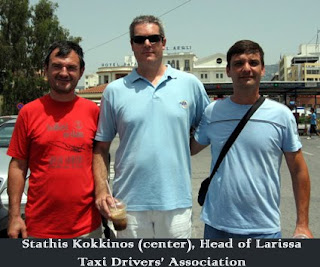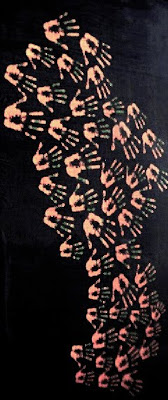The extent that digital technologies are shaping - or at least infiltrating - my travel experience has totally caught me off-guard. The advance online hotel and ticket booking systems have been standard protocol for a while, and it certainly eased things to know where i was going to keep my stuff, sleep and shower the first few days of this trip, enabling me to fully focus on reawakening my traveller's mojo (what's left of it). What i'm talking about is the ubiquitous presence of wifi and myriad hand-held devices everyone is now using to moderate interactions and design their daily itineraries. Truly, a new age is dawning (has dawned!). Feigning impartiality, i can only say that while i miss the physical immediacy of a handwritten journal, sweat-stained paper maps, that simplicity if you will of old school travelling, the options for enhancing personal communication and sharing information now are just fantastic - maybe even a little fantastical.
i had a small taste of the digital traveler's syndrome a couple years ago in Amsterdam, where i met some friends from the states who initiated their daily 'down time' by firing up notepads and kindles to write facebook updates and keep abreast of events as reported in the NY Times. There were also more immediate practical uses, like checking movie times and restaurant locales. Since i was with Americans, it felt very much like a catch up session on where Silicon Valley and Seattle software designers were taking people who can afford to indulge in their newest toys; Amsterdam of course always cutting edge.
Then i get to Turkey and discover this is all much more internationalized than i'd suspected and that i am much farther behind the technology curve than i'm comfortable admitting. Some examples. Sitting on the wall along Istanbul's Marmara shoreline to watch the sunset, i was joined by a guy hawking picture books for tourists who took it upon himself to instruct me on where all the great Istanbul area beaches are located. Initially, he used the age old method of pointing to towns on the other side of the water, but that was all just too indistinct, so out came the Samsung and in less than a minute, we're squinting at Google maps and he's detailing which buses will take me to which plots of sandy beach. The following day on the bus to Cannakale, i sat next to a young woman who spoke as much English as i do Turkish, so to subvert the language barrier she pulls out her phone, logs into Google and brings up Zargan, an online Turkish-English translator.... away we go, no word or phrase off limits.
i’ve just spent 6 days in Turkey and these are thing things i learned how to say:
Thanks
Thank you very much (formal version)
rudimentary counting, especially currency denominations (not so hard because of similarities to Azeri)milk (for coffee)
no sugar (ditto)
stuffed mussels
garlic
wind turbine
wine
smile (imperative form, for picture taking)
population/inhabitants
young male camel (don’t even try to guess)
seafront
Inevitably there were other words figured out in the context of specific interactions, but i couldn’t say now what they were and anyway, that’s not the point. The point is that with so many people carrying around Bluetooth and most cities now full of wifi networks, i didn’t need a large working vocabulary to discuss anything - from water sources  at Troy to the best temperature for storing Turkish delight. Of course all of those conversations were grammatical nightmares, but since i don’t really speak Turkish and the people keying words into Zargan didn’t actually speak English, who noticed (or cared about) the grammatical inadequacies? One significant impact of this technological (r)evolution is that people seem more intent on conveying ideas or bits of information which more deeply reflect who they are, how or what they think. Another tourist at Troy used his phone to bring up the word ‘accompany’ when suggesting we go to the bat cave together. He was a bit creepy so i had to decline, but at least i got a different message than ‘invite’ or ‘take’ would have implied.
at Troy to the best temperature for storing Turkish delight. Of course all of those conversations were grammatical nightmares, but since i don’t really speak Turkish and the people keying words into Zargan didn’t actually speak English, who noticed (or cared about) the grammatical inadequacies? One significant impact of this technological (r)evolution is that people seem more intent on conveying ideas or bits of information which more deeply reflect who they are, how or what they think. Another tourist at Troy used his phone to bring up the word ‘accompany’ when suggesting we go to the bat cave together. He was a bit creepy so i had to decline, but at least i got a different message than ‘invite’ or ‘take’ would have implied.
As far as the young male camel goes, this is probably my favorite technotale to relate. On a ferry crossing the Dardenelle Straights one evening, an extended family sat down around me and i had to ask about the hat one of the boys was wearing. His name is Bura (our young ship of the desert), he spoke a little English but his dad spoke quite a bit and turned out to be a professional soldier, stationed way out in Anatolia to guard the border with Iran. i didn’t recognize the name of the town, but Bura happened to have his little GPS device in tow – ‘I LOVE GPS’ he tells me – and with myself and even more awestruck mother-in-law looking over his shoulder, in about 30 seconds dad had zeroed in on where his guard post is located (within about 10 km). FYI that’s him on the left, aptly attired for messing with the minds of his Iranian counterparts.

As i’ve frequently admitted, i am a total technoweenie when it comes to things like synchronization, proxy servers and the like. i’ve little doubt these stories create the impression that i also live in a time bubble, utterly naïve/out of touch with 21st century technology. Closer to reality is that i’m just a person living in a constant state of working poverty and why self-inflict depression by window shopping electronic devices i’ll never be able to afford? More importantly, do i really need these things to manage my life in any way? Well, the answer is apparently ‘yes and no’.
Online mobility today has become what business cards were in the ‘80s and ‘90s: a form of legitimization, of ascertaining and securing one’s PRESENCE. The number of Facebook users may be slacking in the US, but in this part of the world, talk with anyone 40 and under for any length of time and they will inevitably want to know if they can find you and ‘friend’ you, maybe even skype you. Some do, some don’t, but the main thing i’m finding on this trip is that ‘Are you connected?’ has replaced ‘What do you do?’ in most casual introductory cross-cultural conversations.
This seems overall like a positive development although, like any other communicative and technological opportunity, it all depends on what one does with it. With digital dictionaries, maps and other such applications, people have a tool through which to moderate interactions they might otherwise forego due to shyness, lack of communicative/language ability and so on. Also a good thing so long as we don’t lose perspective on who is ultimately responsible for successful communication, i.e. ourselves.
An old friend of mine and cyber scholar is in Egypt now to learn about how these technological platforms are influencing the politics of activists and others in that country; it will be interesting to get his assessments on how they (the platforms) are helping and hindering substantive socio-political change there. i may be naïve about many of the technologies or how easy it is now to access them, but i want to think i’m smart enough to know the difference between political tools and political movement. Caveat emptor: we are not what we tweet. i look forward to being further impressed by it all making my way around anarchist-ridden Greece. Old habits die hard, i still use a Lonely Planet, but it’s great experiencing what this century is bring to travel and perhaps by my next trip, i’ll have shaped up into a modern digitized woman. There’s gotta be a grant somewhere for that, right? Better start googling. Good thing this city provides free wifi :-)



















